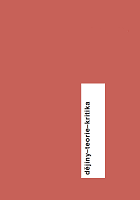Socialistické město v poválečné Evropě jako urbánní typ(ologie)
The Socialist City as a Distinct Urban Typology in Postwar Europe
Author(s): Kimberly E. ZarecorSubject(s): Cultural history, Architecture, Social Theory, Post-War period (1950 - 1989), Sociology of Politics, Sociology of Art, History of Art
Published by: Univerzita Karlova v Praze - Fakulta humanitních studií
Keywords: state-socialism; Czechoslovakia; urbanity; infrastructure; mass housing;
Summary/Abstract: Socialist cities during their design, construction, and expansion have mostly been studied as an expression of the socialist system itself, directly linked to the political fate of the Communist Parties in power. This article revisits the concept of socialist city and argues for the validity of the term both historically and in the present. Looking qualitatively at this distinct European urban typology, two analytical frameworks are offered, infrastructural thinking and the socialist scaffold. The text demonstrates that the universal aspiration for socialist cities was their continuous operation as synchronized instruments of economic production and social transformation in physical space. Distinct from capitalist cities, they had an ideological role in an economic model that instrumentalized cities as nodes in an integrated system or ‘single entity’, a term borrowed from Stephen Kotkin. The agency of the socialist scaffold has continued into the era of neoliberalism, shown here to have previously unexplored roots in socialism.
Journal: Dějiny - Teorie - Kritika
- Issue Year: 2018
- Issue No: 02
- Page Range: 231-245
- Page Count: 15
- Language: Czech

